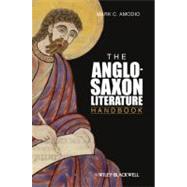
Note: Supplemental materials are not guaranteed with Rental or Used book purchases.
Purchase Benefits
What is included with this book?
| Backgrounds and Beginnings This chapter will have an introduction and four sections: Language; Politics and Religion; Material Culture; Key Figures | |
| The introduction will discuss Roman Britain and the transformation of Britain following the Roman withdrawal in the early years of the fifth century | |
| Language: because a sense of Old English is crucial to an appreciation of Anglo-Saxon literature, this section will include a brief description of the language''s chief syntactic and grammatical characteristics | |
| This section will contain illustrative examples of paradigms but it will not be clotted by them: the interested student will be directed to Mitchell and Robinson''s excellent grammar | |
| Other topics to be covered will include the major dialects and poetics | |
| Politics and Religion: Anglo-Saxon kingship, the coming of the Saxons, the Viking invasions and settlement, the Norman Conquest, the coming of Christianity, the establishment and subsequent reform of the Church, the construction (and in some cases destruction) of the great monastic houses | |
| Material Culture: archeology; architecture; artistic achievement; manuscript production and dissemination | |
| 2 Key figures: lfric the Homilist thelfld thelred II Alcuin Aldhelm Alfred the Great Asser St. Augustine Bede St. Boniface Byrhtnoth Cdmon Cnut St. Cuthbert Cynewulf St. Dunstan Gildas Pope Gregory the Great Hengest Hild Offa Wrferth Wulfstan 3 Key Readings: Poetry This chapter will cover most of the major and some of the minor poetry extant from the Anglo-Saxon period in an introduction and five sections: Secular Heroic Verse, Christian Heroic Verse, Biblical Verse, Elegiac Verse, and Miscellaneous Religious and Secular Verse | |
| The introduction will discuss in more detail the growth and development of the specialized lexical, rhetorical, and narrative features of the Anglo-Saxon poetic tradition, a tradition that we are coming to see is a truly supple and dynamic one | |
| The introduction will also discuss in more detail the interaction of oral and literate culture in the period | |
| Secular Heroic Verse Beowulf Deor Widsith The Battle of Brunaburh The Battle of Maldon The Battle of Finnsburh | |
| Christian Heroic Verse Andreas Fates of the Apostles Juliana Elene Guthlac | |
| Biblical Verse Christ Genesis Christ and Satan Exodus Daniel Judith The Metrical Psalms | |
| Elegiac Verse The Wife''s Lament The Seafarer The Wanderer The Husband''s Message The Ruin Wulf and Eadwacer | |
| Miscellaneous Religious and Secular Verse The Dream of the Rood The Phoenix Cdmon''s Hymn The Gifts of Men The Fortunes of Men Maxims Soul and Body II Resignation The Exeter Book Riddles Judgment Day I Judgment Day II The Metrical Charms Bede''s Death Song Soul and Body The Rhyming Poem Physiologus Prose This chapter will have an introduction and four sections: Translations, Homilies, The Anglo-Saxon Chronicle, and Prose Fiction and Miscellaneous Prose Works | |
| The introduction will offer a general sketch of the Anglo-Saxon prose tradition and will stress both its uniqueness in the medieval world and the breadth of its accomplishment | |
| The introduction will also touch briefly upon some of the major works of Anglo-Latin literature produced on the island during the period | |
| Translations King Alfred: Gregory the Great''s Pastoral Care, Boethius''s De Consolatione Philosophiae, and Augustine''s Soliloquies Bishop Wrferth: Gregory the Great''s Dialogues The Old English version of Bede''s Historia ecclesiastica | |
| Homilies The Blicking Homilies lfric''s Catholic Homilies and Lives of Saints Wulfstan''s Homilies | |
| The Anglo-Saxon Chronicle | |
| Prose fiction and miscellaneous prose works Apollonius of Tyre, the Wonders of the East, legal and scientific writings 5: Themes and Topics Subjects to be covered in this chapter will include comparative work on Old English and the Germanic world, the role of women, notions of authorship and textual integrity, techniques of editing, textual recovery (via digital and non-digital tec | |
| Table of Contents provided by Publisher. All Rights Reserved. |
The New copy of this book will include any supplemental materials advertised. Please check the title of the book to determine if it should include any access cards, study guides, lab manuals, CDs, etc.
The Used, Rental and eBook copies of this book are not guaranteed to include any supplemental materials. Typically, only the book itself is included. This is true even if the title states it includes any access cards, study guides, lab manuals, CDs, etc.